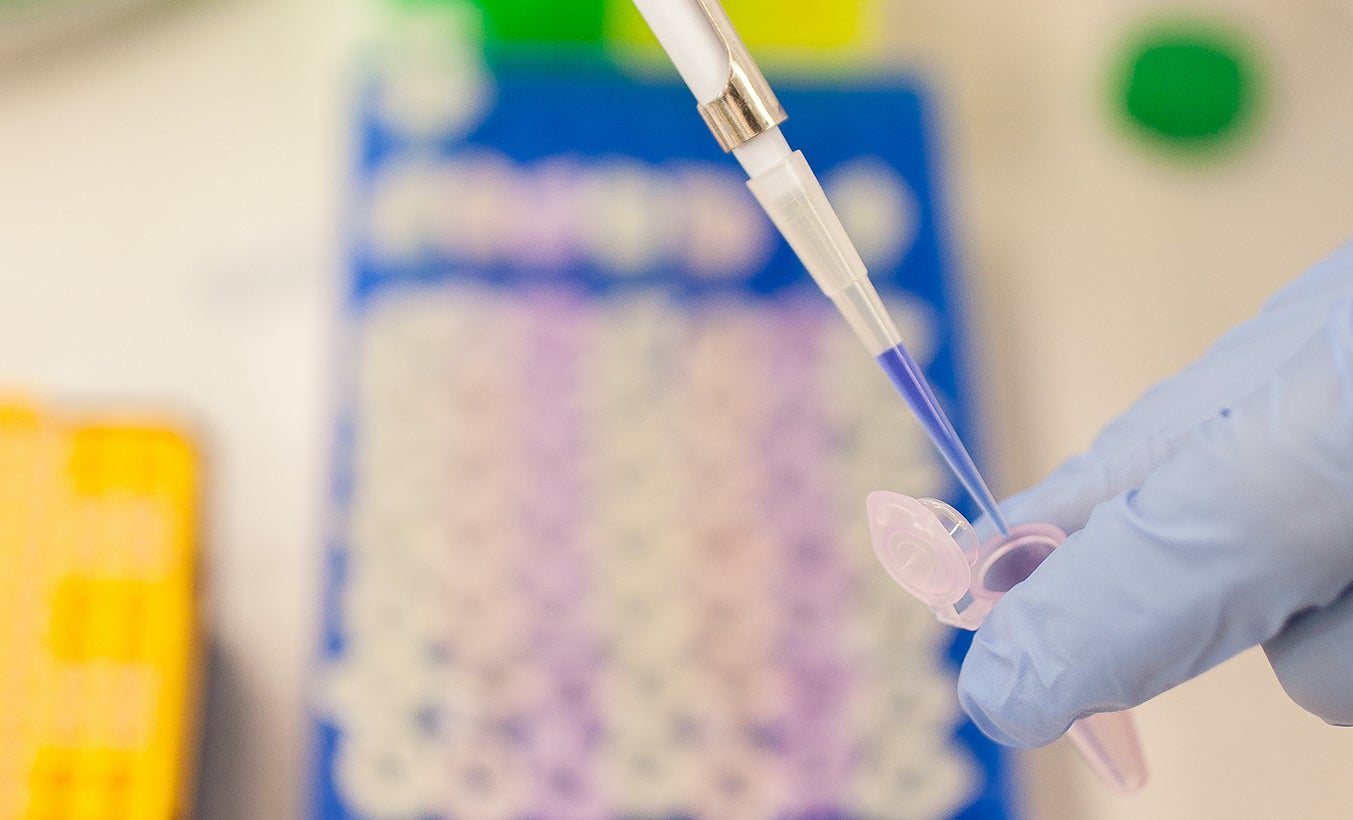It has been another year of impressive research productivity at the URI College of Pharmacy. In fiscal 2019, more than 30 College of Pharmacy researchers were credited with external research funding.
In an effort to spread the word about the successes of our faculty scholars, the College Research Committee compiles a description of research activities twice a year. The information that follows is their effort to update youon the various research endeavors in the College, encourage you to collaborate with others with complementary interests and to recognize the successful funded researchers in the College,” Dean Paul Larrat said.
A complex look at ongoing research project follows:
 Jessica Alber
Jessica Alber
- Atlas of Retinal Imaging in Alzheimer’s Study (ARIAS) (January 2019, Morton Plant Hospital Assoc.,Inc., $521,950). The major goals of this multi-site clinical trial are to develop a dynamic dataset and 3D atlas of longitudinal retinal biomarker changes across the cognitive aging spectrum.
- RI – Using an Alzheimer’s Disease Blood Test to Predict Amyloid PET in ApoE e4 Non-Carriers (August 2019, Brown University, $42,632). The main goal of this project is to determine the incrimental utility of a proteomic/metabolic blood biomarker panel in predicting amyloid PET positivity in cognitively normal older adults, with an emphasis on APOE E4 non’carriers.
- RI – Building an Infrastructure and Dynamic Dataset for AD Risk Assessment (May 2019, Brown University, $8,754) The major goals of study are to build a multi-disciplinary team with biostatistics, biomedical informatics, neuropsychology, and neuroscience expertise, to develop a sustainable, collaborative database of AD risk markers, and to generate a risk algorithm that will identify individuals at early risk for AD using machine learning technique.
 Jeffrey Bratberg
Jeffrey Bratberg
- Intervention to Increase Naloxone Engagement and Distribution in Community Pharmacies” A Four-State Randomized Trial (January 2019, Boston Medical Center, $37,739). The RESPOND TO PREVENT program provides training, resources, and tools to improve the quality and success rate of naloxone offers by community pharmacists. Through provided scripting, communication guidelines, and patient education, pharmacists can enhance patients’ receptivity and decrease stigma associated with harm reduction practices.
 Ashley Buchanan
Ashley Buchanan
- Causal Inference Methods for HIV Prevention Studies Among Networks of People Who Use Drugs (Supplement) (July 2019, NIH, $247,359). Public health studies aimed at earlier HIV treatment have made progress towards reducing HIV incidence not only for those directly-treated drug users but also their risk networks; however, research-to-date has been impeded due to a lack of methods to estimate how interventions permeate a risk network. We propose to develop causal statistical inference methods combined in novel ways with network science applicable in settings with social influence.
 Xinuan Chen
Xinuan Chen
- A Novel Adjuvant to Boost Influenza Vaccination (May 2019, National Institute of Health, $410,303). This project develops a physical radiofrequency-based adjuvant with potent humoral and cellular adjuvant effects to boost influenza vaccination with minimal local, systemic or long-term side effects.
Bongsup Cho
 Rhode Island IDeA Network for Excellence in Biomedical Research, (May 2019, National Institutes of Health, $4,722,159). RI-INBRE is a NIH-sponsored state-wide program grant and its major objective is to support and develop talented individuals, committed to research careers in Rhode Island, and to build the biomedical research capacity of Rhode Island higher education institutions.
Rhode Island IDeA Network for Excellence in Biomedical Research, (May 2019, National Institutes of Health, $4,722,159). RI-INBRE is a NIH-sponsored state-wide program grant and its major objective is to support and develop talented individuals, committed to research careers in Rhode Island, and to build the biomedical research capacity of Rhode Island higher education institutions. - CI – STEEP – Sources, Transport, Exposure and Effects of Perfluoroalkyl Substances (April 2019, National Institutes of Health, $93,778). The major goal of the multi-million-dollar grant for NIEHS Superfund Research Program (P42) is to address the emerging and expanding problem of poly- and per-fluorinated alkyl substances (PFASs) contamination. Dr. Cho is the leader of Training Core.
 Ruitang Deng
Ruitang Deng
- Interplay of Bile Acid and Estrogen Signaling (January 2019, National Institute of Health, $269,434). Hepatocellular carcinoma (HCC) is the sixth most common cancer worldwide and the third leading cause of cancer-related deaths. At present, there are limited options in treating HCC patients. This multi-year R01 grant is aimed at understanding the underlying mechanisms by which HCC develops through the dysregulation of the bile acids/ farnesoid X receptor (FXR) and estrogens/estrogen receptor alpha (ER) signaling pathways.
 Nisanne Ghonem
Nisanne Ghonem
- Evaluation of the Preliminary Safety and Efficacy of Treprostinil (Remodulin) in Reducing ischemia-Reperfusion Injury During de Novo Adult Kidney Transplantation (March 2019, Rhode Island Hospital, $302,716). A single-center, open-label, Phase I/II dose-escalation study to determine the preliminary safety and efficacy of treprostinil in reducing I/R injury associated with adult de novo kidney transplantation.
- An In Vivo Study of Treprostinil, a Prostacyclin Analog, in the Prevention of Ischemia-Reperfusion Injury to the Kidney (July 2019, Brown University CTR, $90,651). Kidney transplantation is life-saving for patients with end-stage renal diseases, however, a shortage of organs limits those available for transplantation, and thousands of patients die every year while on the wait list for a transplant. Using less suitable organs to overcome the shortage more often results in delayed kidney function or kidney failure. New therapies are needed to reduce kidney dysfunction and failure after transplantation. This project will test the efficacy of treprostinil in reducing kidney injury for kidney transplantation.
 Paula Grammas
Paula Grammas
- RYAN – Cerebrovascular dysfunction in AD:targeting the mechanisms of vascular activation (March 2019, Cure Alzheimer’s Fund, $56,404)
- RI – A therapeutic Target for Cerebral Amyloid Angiopathy (September 2019, National Institute of Health, $422,125)
Dennis Hilliard
- FY2018 Paul Coverdell Crime Laboratory Improvement Program (January 2019, RI
 Department of Public Safety, $61,191). Funds were used to provide new benches, benchtops, examination tables, storage cabinets and new fume hoods. The benches/tables and benchtops provided about 57, linear feet of new and replacement laboratory grade benches/tables in our Trace and Firearms sections and 42 linear feet of storage space. The Laboratory was able to purchase six (6) fume hoods that added to or replaced fume hoods in the Trace, Latent Print and Firearms section.
Department of Public Safety, $61,191). Funds were used to provide new benches, benchtops, examination tables, storage cabinets and new fume hoods. The benches/tables and benchtops provided about 57, linear feet of new and replacement laboratory grade benches/tables in our Trace and Firearms sections and 42 linear feet of storage space. The Laboratory was able to purchase six (6) fume hoods that added to or replaced fume hoods in the Trace, Latent Print and Firearms section. - Edward Byrne Justice Assistance Grant (Byrne/JAG) Sub-Grant Laboratory Improvement (October 2019, RI Department of Public Safety, $17,793). These funds were used in the creation of five (5) rooms within Fogarty 009, to provide space for use in the BPS 101 and 102 courses, as crime scene area rooms. These rooms are used for practical exercises for the law enforcement officers who attend the two-semester course: Criminal Investigations: Scientific Evidence I & II. The rooms greatly benefit the educational component of the State Crime Laboratory in conjunction with the University and the College of Pharmacy.
 Anita Jacobson
Anita Jacobson
- IIHI Community First Provider Program – SAMHSA ROTA Program (September 2019, Substance Abuse & Mental Health Services, $604,565). The Community First Responder Program is a collaboration between the College of Pharmacy, College of Nursing and Cooperative Extension to offer opioid use disorder eduction and overdose prevention to rural communities. Specifically the program will offer health screenings on the Mobile Health Unit, educational modules for healthcare professionals and the public on the Cooperative Extension website, and educational seminars with naloxone distribution in rural communities across Rhode Island.
- Rhode Island Developmental Disabilities Council – RIDDC FY 2019 (September 2019, US Dep of Health & Human Srvcs, $480,985). The Developmental Disabilities Act provides for a formula grant to provide comprehensive planning for people with developmental disabilities, develop a State Plan, and implement selected activities contained in the State Plan. The Act requires that the Council be attached to a State Agency to provide very specific support functions to support the Council, The University of Rhode Island is that state agency under RIGL40.1-1-9.
 Stephen Kogut
Stephen Kogut
- Institutional Development Award (IDeA) Program Infrastructure for Clinical and Translational Research (May 2019, Brown University, $202,118). This program is a statewide consortium of universities, hospital systems and non-profit agencies that provides the infrastructure to support, train and educate investigators conducting clinical and translational research. Dr. Kogut is directing the team responsible for the tracking and evaluation aspects of the initiative.
- Empowering the Safe, Effective and Efficient Use of Medications in Older Adults (December 2019, Care Transformation Collaborative RI, $50,000). This project will utilize data from the RI All Payer Claims Dataset to measure a range of pharmacy-related performance measures spanning the domains of Safety, Effectiveness and Efficiency. The results of the analysis will be applied to inform local systems of care in their efforts to optimize medication use among older adults.
 Kerry Laplante
Kerry Laplante
- COBRE Center for Antimicrobial Resistance and Therapeutic Discovery (August 2019, The Miriam Hospital, $15,522). The principal objective of this Phase I COBRE application is to build a unique, multi-disciplinary center of excellence to study mechanisms of antimicrobial resistance and develop therapeutic countermeasures. The long-term goal of the Center for Antimicrobial Resistance and Therapeutic Discovery (CARTD) at The Miriam Hospital of the Lifespan Hospital Group is to develop new therapies for infections caused by drug resistant pathogens. Dr. LaPlante will participate in the CARTD by providing advice on pharmacodynamics, pharmacokinetics, and other pharmacology considerations related to drug development.
 Kerry Laplante and Aisling Caffrey
Kerry Laplante and Aisling Caffrey
- Utilization and Treatment Outcomes with Ceftolozane/tazobactam in the National Veterans Affairs Healthcare System (May 2019, Ocean State Research Institute, Inc, $60,000). To describe utilization of ceftolozane/tazobactam in the national VA Healthcare System, to enumerate cohorts with similar microbiological findings and identify antibiotic exposures in these groups through exposure mapping.
 Deyu Li
Deyu Li
- Mutational Spectra of Bulky DNA Lesions (January 2019, National Institute of Health $426,504). Many aromatic amines are environmental toxins and human carcinogens. They damage genome and form different bulky DNA lesions, which give rise to different mutation patterns. This application will study the mutational spectra of bulky DNA lesions generated from aromatic amine exposure and provide insights into the development of tumors.
 Rita Marcoux and Lisan Cohen
Rita Marcoux and Lisan Cohen
- Pharmacy Program Oversight/Utilization Review (July 2019, RI Department of Corrections, $155,293). This grant involves providing clinical services and oversight of pharmaceutical purchasing for the Department of Corrections – Rhode Island. This includes development of pharmacy policies and procedures, management reporting, quality assurance, clinical and formulary services, and oversight of medication administration, storage and inventory and the computerized pharmacy order entry system and clinical rotation and training projects for pharmacy students.
 Jyothi Menon
Jyothi Menon
- MRI: Acquisition of a Scanning/Transmission Electron Microscope for Materials Research and Education (September 2019, National Science Foundation, $322,000). The NSF-MRI is a Major Research Instrumentation grant, and the funds will be used to purchase a state-of-the-art 200kV field emission scanning transmission electron microscope (S/TEM), with Energy Dispersive Spectroscopy (EDS) and Electron Energy Loss Spectroscopy (EELS) detectors, along with a Direct Electron Camera (DEC), This instrument will support research in the areas of Nanomedicine, Environmental Science and Engineering, Biotechnology and Structural Biology, Energy Materials, and Materials Dynamics at the Nanoscale at URI.
 Katharina Quinlan
Katharina Quinlan
- Impairment of Spinal Development in Cerebral Palsy (Supplement) (July 2019, National Institute of Health, $306,320). In this project, the Quinlan lab is exploring the potential to treat cerebral palsy through modulation of neural networks in the spinal cord. These networks are disrupted during development by the injuries that cause the condition. Finding aberrations in the behavior of spinal neurons may provide a more direct pathway to remedy associated motor dysfunction. Parallel, longitudinal studies will quantify timing and development of abnormalities in spinal circuits in children with cerebral palsy and in a rabbit model where we can more directly investigate altered properties spinal neurons and neuronal circuits.
Katharina Quinlan and Nasser Zawia
- Impairment of Spinal Development in Cerebral Palsy – Supplement (August 2019, National Institute of Health, $376,565)
 David Rowley
David Rowley
- Biocontrol of Early Mortality Syndrome in Farm Raised Shrimp (February 2019, Harvard University, $26,900)
- Molecular Mechanisms of Interspecies Interactions in Mitigating Aquaculture Diseases (July 2019, US Department of Agriculture, $141,036)
- Aquaculture: Modifying Microbiomes to Mitigate Infectious Diseases in Aquaculture Facilities (September 2019, US Department of Agriculture, $99,000)
 Navindra Seeram
Navindra Seeram
- Longvida Curcumin Human Pharamcokinetics (PK) Study (May 2019, URI Research Foundation, $8,268). To evaluate the bioavailability and pharmacokinetics of curcumin in healthy volunteers after oral consumption of Longvida curcumin supplement.
Jie Shen
- Bioequivalence Considerations of Topical Rectal and Vaginal Products (September 2019, Food and Drug Administration, $250,000).
 The major goal of this project is to develop comparative product characterization-based bioequivalence approaches that are suitable for topical rectal and vaginal drug products, and to help advance regulatory review and approval processes for these products.
The major goal of this project is to develop comparative product characterization-based bioequivalence approaches that are suitable for topical rectal and vaginal drug products, and to help advance regulatory review and approval processes for these products. - A Continuous Manufacturing Platform for Complex Dosage Forms (September 2019, University of Connecticut STORRS, $432,827). The major goal of this project is to build and test a continuous manufacturing platform with modular components for complex dosage forms such as liposomes for use in a cGMP facility.
- A bioinspired In Situ Delivery Platform with Tunable Drug Release for Improved Cancer Therapy (April 2019, Rhode Island Foundation, $25,000). The major goal of this project is to develop a bioinspired in situ gelling drug delivery platform with tunable drug release for localized cancer therapy.
 Angela Slitt
Angela Slitt
- CI – STEEP – Sources, Transport, Exposure and Effects of Perfluoroalkyl Substances (April 2019, National Institute of Health, $264,951). The major goal of the multi-million-dollar grant for NIEHS Superfund Research Program (P42) is to address the emerging and expanding problem of poly- and per-fluorinated alkyl substances (PFASs) contamination. Dr. Slitt is the leader of Project 3 — evaluation of PFAS exposure as a risk for obesity-induced dysregulation of hepatic and adipose tissue function.
 Lynn Taylor
Lynn Taylor
- IIHI – Patient Centered Models of Hepatitis C Care for People Who Inject Drugs (Sponsor changed from Clemson to PCORI due to First yr DP) (February 2019, Upstate Affiliation Organization, $257,667). The purpose of this randomized, 8-site, national study is to determine the optimal approaches for treating HCV in people who inject drugs (PWID) at methadone programs and community health centers, and to develop the structure for future research of HCV among people who inject drugs.
 William Van Nostrand
William Van Nostrand
- Understanding the Origins of Amyloid Deposition in Cerebral Amyloid Angiopathy (April 2019, National Institute of Health, $383,750). Recent work from our laboratory has indicated that the structure of amyloid fibrils that accumulate in cerebral blood vessels, a condition known as cerebral amyloid angiopathy (CAA), is different than amyloid fibrils that accumulate in brain parenchymal plaques. The major goal of this project is to elucidate the novel structural features of amyloid deposition in CAA using in vitro and transgenic mouse approaches.
- The Role of Copper in Cerebral Amyloid Angiopathy Year 5 (May 2019, National Institute of Health, $383,750). We have recently found that the amyloid deposits that accumulate in cerebral blood vessels harbor elevated amounts of copper. The major goal of this project is to determine whether there is a structural basis for the accumulation of copper in the vascular amyloid associated with cerebral amyloid angiopathy (CAA) and how copper influences the formation of CAA and pathologies associated with this condition using transgenic rodent models.
- Cerebral Amyloid Angiopathy Fluid Biomarkers Evaluation (CAFE) (July 2019, National Institute of Health, $652,534). This project focuses on the development of novel biological fluid markers for the condition known as cerebral amyloid angiopathy (CAA), which is the accumulation of amyloid in blood vessels of the brain. Here we take a complementary approach utilizing cerebrospinal fluid and blood samples obtained from CAA patients and novel animal models of CAA for discovery of CAA biomarkers.
 Ami Vyas
Ami Vyas
- Use of Rhode Island-All Payer Claims Database to Evaluate Rhode Island Women’s Breast Cancer Screening Compliance and Impact on Breast Cancer Diagnosis (November 2019, RI Department of Health, $17,999). The purpose of this study is to evaluate mammography screening use in women who obtained their prior screenings at the women’s breast cancer screening program. We will also examine the association between compliance with mammography screening and the stage at breast cancer diagnosis among women in Rhode Island.
 Xuerong Wen
Xuerong Wen
- Neonatal Neurodevelopment and Maternal Outcomes in Pregnancy with Opioid Exposure (February 2019, National Institute of Health, $435,491). The rapid increase in the incidence of opioid-related overdoses and deaths has become a major public health threat in the United States. This project focuses on the relationship between perinatal opioid exposure and adverse health outcomes in mothers and children. Our results will help determine the role of perinatal opioid exposures on children development and provide evidences for improved perinatal care.
 Nasser Zawia
Nasser Zawia
- Novel Analogs for Tauopathies and Their Mode of Action (J. Hill) (April 2019, National Institute of Health, $68,342). Tolfenamic acid has been shown to impact disease processes related to Alzhimer’s disease. This project will test novel synthetic analogs of Tolfenamic acid for efficacy and mechanism of action as well as off-target effects.
Anne Hume, Erica Estus and Christine Eisenhower
- RI Geriatrics Workforce Enhancement Program (July 2019, US Dep of Health & Human Srvcs, $112,500). The Rhode Island Geriatrics Workforce Enhancement Program (RI-GWEP) focuses on educating primary care providers and health professions trainees in the core principles of geriatrics. Interprofessional teamwork and collaborative practice in caring for older adults is a major focus of the project

